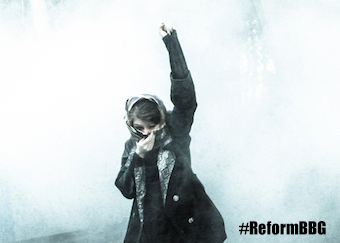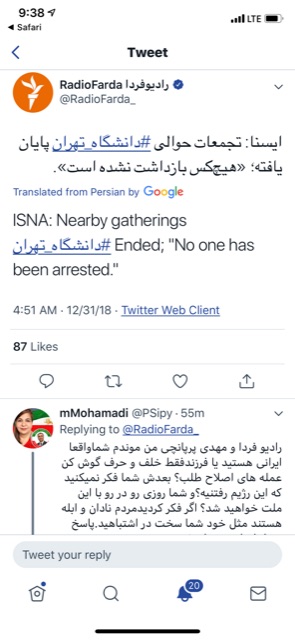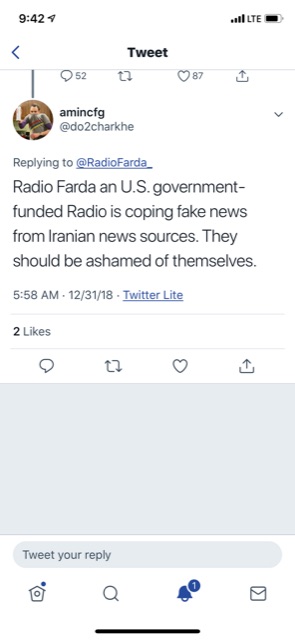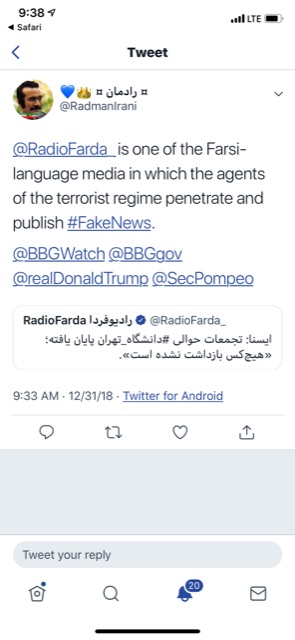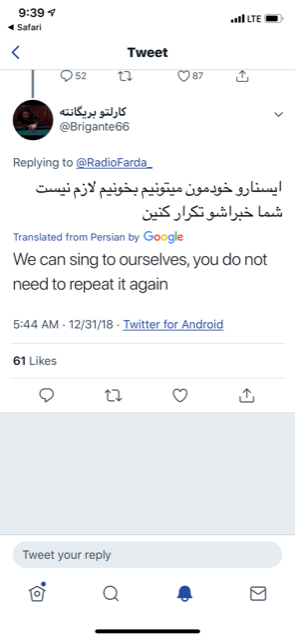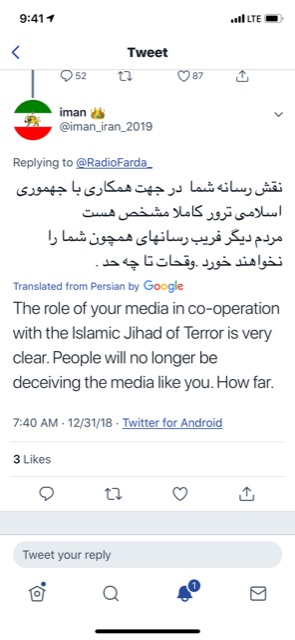BBG Watch Commentary
Iranians are enraged by Radio Free Europe/Radio Liberty’s (RFE/RL) Radio Farda, as well as in other instances by the Voice of America (VOA) Persian Service, for repeating the Iran regime’s propaganda without any added value of context and effective counter information or argument. Some Iranians in Iran and abroad are literally cursing Radio Farda and VOA in comments to some of the tweets posted by U.S. taxpayer-funded media outlets being managed by the U.S. Agency for Global Media (USAGM), previously called the Broadcasting Board of Governors (BBG).
English translations of some of the Iranian comments to one Radio Farda tweet, with some readers commenting in general on USAGM media, were provided by an Iranian-born American journalist and media expert who had done work earlier for U.S. international broadcasting and the U.S. State Department in Afghanistan and Pakistan.
Radio Farda Tweet quotes ISNA News Agency on Dec. 31, 2018:
ایسنا: تجمعات حوالی #دانشگاه_تهران پایان یافته؛ «هیچکس بازداشت نشده است».
— RadioFarda راديوفردا (@RadioFarda_) December 31, 2018
“The demonstration around Tehran University has ended and nobody was arrested.”
The angry readers were quick to respond and there was a lot of cursing on Twitter.
Here is some of what they said:
“(Curse word) you, money from the US, and news from ISNA??”
Another tweet,
“What did you sell your dignity to? Who is more important than people? It is really bad to be a brainwash hooker. “
Another tweet,
“If anyone wants to read this, they can buy the local Hamshahri Newspaper and read it. (Curse word) The person who is tweeting is so excited to tweet that first he says according to the newspaper and now according to ISNA. He doesn’t know what to do and he is going crazy.“
Another Iranian writes,
“Please look at the title of your website and be ashamed that you are a platform for the regime and you are silencing their voice. Prince Pahlavi was right when he said that the regime reporters who are exported and working in Farsi outlets should be cleaned out. “
Another Iranian writes,
“We know how to read ISNA, you don’t need to repeat what they say.”
Another Iranian says,
“Look at the responds and lift your heads up and see how people see through everything. Don’t be offended. We have entered into a new era where the media traitors have lost their influence and people are getting their news from trusted sources. Islamic Republic has reached its end.”
Another Iranian:
“Truly there is no shame and now Radio Farda is directly quoting the Islamic Republic news agencies.”
Another Iranian:
“Your betrayal to history will remain and wait for the sea of anger by the people that will emerge.”
Mahtab Farid, an Iranian American journalist and international media expert who has done work in Afghanistan and Pakistan, wrote in a post on Facebook:
Angry Iranians go on Twitter after the US funded Radio Farda quoted ISNA in a tweet and said, how the demonstration around Tehran University has ended and nobody was arrested. Radio Farda News Director, Mehdi Parpanchi also tweeted how Naja, the Islamic Republic police tells the demonstrators [in] front of Tehran University that they are required to get a permit. Decided not to share the tweets on my post because there was so much profanity and anger. However, this one was powerful. “Your betrayal to history will remain and wait for the sea of anger by the people that will emerge.”
While some current VOA Persian and Radio Farda reporters share some blame for their inability to use short-form social media posts without being perceived as conduits of regime propaganda, the ultimate responsibility for this failure rests with the senior USAGM, VOA and RFE/RL leadership which tolerates blatant bias, lack of balance, and partisanship in some political agency media content while firing VOA Mandarin Service journalists for not including enough “balance” from Chinese communist officials. If USAGM wants both balance and objectivity, the leadership needs to be consistent and needs to show it. Current USAGM leaders lack experience in intercultural communications, countering propaganda and managing government programs.
During the Cold War, the Voice of America was sometimes criticized for not doing enough, but observers of U.S. international broadcasting and former VOA journalists do not recall anyone accusing VOA of repeating or being fooled by communist regime propaganda. An independent study by the American Foreign Policy Council (AFPC), which the BBG itself commissioned and then ignored, confirmed extreme pro-regime bias at both Radio Farda and VOA in recent years.
Iranians in Iran and abroad, including Iranian-American journalists, are exasperated. One such critic wrote “I am so exhausted with VOA. I feel that I wasted my life [trying to get USAGM to reform] and nothing happened.”
Iranians in Iran and abroad have had enough of USAGM being perceived as taking the regime’s propaganda at face value. Chinese social media comments say the same thing.
If the agency journalists are unable to provide context and added value, then they are doing the propaganda work of repressive regimes by reporting their misleading statements without any immediate and effective counter. Twitter is no excuse. One can easily counter fake news or misleading regime statements on Twitter even while reporting them—all in the same short tweet. It takes some skill, but it is easily done, one former VOA journalist and manager said.
A journalist who lived in a communist-ruled country said that what seems as normal journalism in a country free of censorship and with multiple sources of information, is not at all normal in a closed society. USAGM leaders and some journalists lacking training and proper leadership are confusing balance with objectivity, the journalist observed. These are not the same, certainly not for people being bombarded daily by regime propaganda, was another observation. People in Iran, China and Russia are deeply offended when they see US-supported media outlets repeating misleading regime propaganda and not providing any context, the journalist pointed out.
More angry comments from Iranians can bee seen to this RFE/RL Radio Farda tweet.
هشدار فرمانده ناجا در مورد تجمع در مقابل دانشگاه تهران: نیازمند مجوز هستید https://t.co/wnRid09XAQ
— Mehdi Parpanchi (@Parpanchi) December 31, 2018
